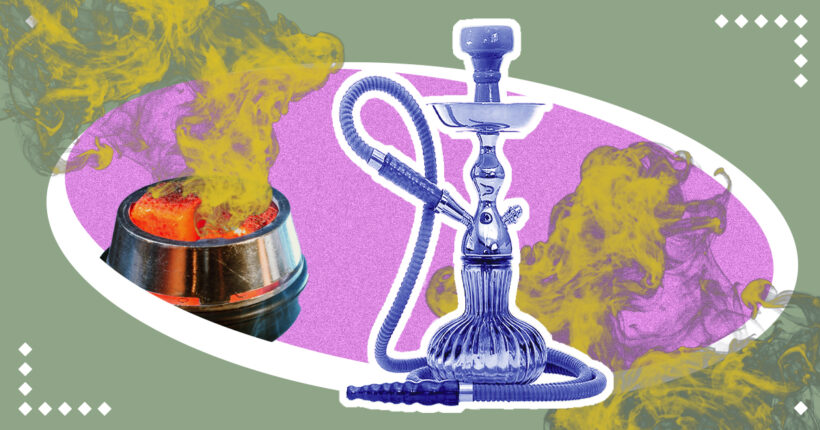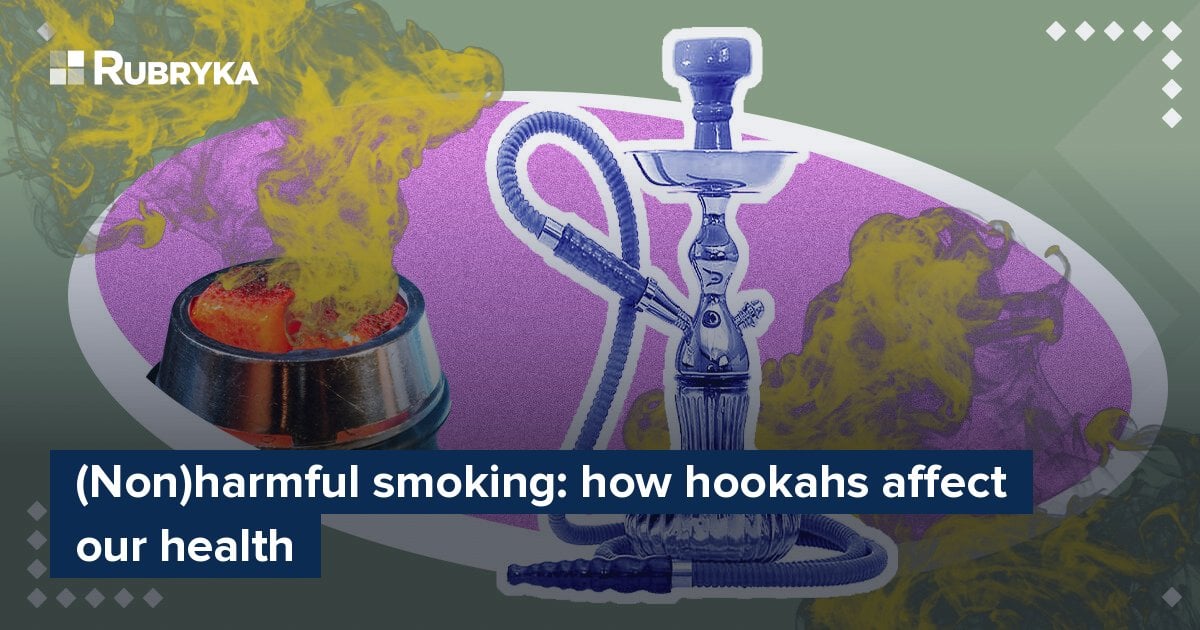
To delve into this topic, Rubryka consulted experts. Pulmonologist and phthisiologist Rostyslav Liubevych, along with psychiatrist and top-level narcologist Yevhen Skrypnyk, discussed the impact of hookah on health.
What is the problem?
Hidden danger

Hookah smoking is popular among young people. Photo from open sources
Many people believe that smoking hookah is less harmful than smoking cigarettes. This perception often stems from the idea that water or filters in hookahs significantly reduce toxic substances in the smoke. However, this misconception can lead to serious health risks.
Researches indicate that smoking hookah is no less damaging to the body than cigarettes. Yet, its perceived safety causes many to overlook the dangers. A survey of nearly 700 young Americans revealed that about half believed hookah to be a less harmful alternative to cigarettes, with around 30% using both. Researchers highlight that hookah use has grown significantly among young people in recent years, especially among women.
"The myth of hookah's safety arises from the lack of information campaigns addressing its risks compared to cigarette smoking," explains pulmonologist Rostyslav Liubevych. "How often do you see a no-smoking sign featuring a cigarette crossed out with a red mark? Quite often, I'd say. But have you ever seen such a sign for hookah? Personally, I never have. Additionally, smoking hookah has become a ritual that fosters social bonding in group settings."
Some facts about hookah:
- The WHO reports that smoking hookah for 1 hour is equivalent to smoking 100 cigarettes. This is because while smoking one cigarette, a smoker inhales about 0.6 liters of smoke, whereas a hookah smoker inhales a total of 74.1 liters of smoke during a typical session lasting 20–80 minutes.
- Carbon monoxide and combustion products from both tobacco and charcoal enter the body when smoking a hookah. Furthermore, hookah smokers inhale significantly higher levels of carbon monoxide.
- Many people believe that the water in a hookah purifies tobacco smoke from harmful substances, but this is a misconception. Scientific studies have shown that water filters out only about 3% of toxic impurities. In reality, water primarily cools the smoke rather than making it less harmful.
Health risks

Inhaling hookah smoke poses health risks. Photo from open sources
Hookah smoke contains carcinogens, heavy metals, carbon monoxide, and other harmful compounds found in cigarette smoke. These include nitrosamines, polycyclic aromatic hydrocarbons (PAHs), formaldehyde, and benzene. Carbon monoxide is also produced during coal combustion. A 30-minute hookah session exposes users to a significant dose of carbon monoxide, leading to oxygen deprivation in the body, known as hypoxia. Additionally, hookah smoke contains toxic substances linked to coronary heart disease, stroke, lung cancer, other cancers, and various cardiovascular and respiratory diseases.
"I have treated patients who smoke hookah, as well as those who transitioned from cigarettes to hookah," says Liubevych. "They all experienced chronic cough, obstructive lung disease, and other related conditions. There is no substantial difference in the decline of lung function between cigarette smokers and hookah smokers, even considering that hookah use is often less frequent. This underscores that there is no safe time or dose for smoking. Interestingly, the prevalence of chronic bronchitis is even higher among hookah smokers."
As a tuberculosis specialist, Dr. Liubevych emphasizes that hookah smoking can also facilitate the spread of tuberculosis through shared use of the pipe, even when replaceable mouthpieces are used.

Poster of a joint initiative of the Center for Public Health of the Ministry of Health of Ukraine and the NGO Life
"If you smoke a hookah in a public place, you should understand that the flasks and tubes used are not sterilized properly," warns narcologist Yevhen Skrypnyk. "This means all the microbes from the bodies of people who smoked that hookah before you remain and multiply in the flasks and tubes."
Skrypnyk highlights that smoking hookah can lead to infections such as herpes, fungal infections, and streptococcus, which can cause tonsillitis, kidney inflammation, and other illnesses. Additionally, Helicobacter pylori, responsible for gastritis and stomach or duodenal ulcers, can also be transmitted this way.
Hookah smoking can even spread blood-borne infections, such as hepatitis C, as users may unknowingly share a hookah with someone experiencing bleeding gums.
The effects extend beyond infections. Smoking negatively impacts men's reproductive function and complicates pregnancy for women. Research shows that children born to women who smoked frequently (including hookah) during pregnancy are at higher risk of respiratory diseases, have significantly lower birth weights, and face a greater likelihood of chronic conditions from birth.
Passive exposure to hookah smoke is also harmful. If you are in a room where hookah is smoked, you risk developing the same diseases as smokers. Heavy metals settle on surfaces in such environments, increasing the potential for poisoning the body.
Addicted and poisoned

Photo: HelgaBragina/Shutterstock
Hookah smoke addiction is comparable to cigarette addiction because hookah mixtures contain the same nicotine that causes dependency, emphasizes Skrypnyk. Studies show that hookah smokers often transition to smoking regular cigarettes and vice versa, leading to a compounded harmful effect on the body.
Even "nicotine-free" or "tobacco-free" hookah mixtures are dangerous. In addition to nicotine, they contain toxic substances with biological activity similar to those found in regular tobacco products.
"There are original hookahs with nicotine-free mixtures containing aromatic components, essential oils, syrups, sweets, and glycerin. Some even feature mint, marketed as having a 'calming' effect on the smoker," explains Liubevych. "However, under high temperatures, these mixtures produce combustion products and hydrocarbons. Additionally, preservatives and flavorings are burned, releasing potentially carcinogenic substances that harm your lungs."
The risks are even greater when smokers create their own mixtures using unknown substances. While these homemade "hookahs" may not contain nicotine and might not lead to physical dependence, they can still cause psychological dependence.
Liubevych emphasizes that the only substances safe to inhale are pharmacological preparations for nebulizer therapy, which are clinically proven for safety and effectiveness in treating respiratory diseases. Such treatments should only be prescribed by a doctor.
What is the solution?
The Public Health Center reminds everyone that since 2012, smoking hookahs, tobacco products, electronic cigarettes, and heated tobacco products has been prohibited indoors in establishments of any ownership, including cafes, bars, and restaurants.
If your right to a smoke-free environment is violated, do not hesitate to defend your rights. Here's what you can do:
- Complain to the administrator.
- Write a comment in the "Book of Complaints and Suggestions."
- Report the violation to the State Service for Food Safety and Consumer Protection of Ukraine or through the Public Health Center's service. To ensure your complaint is addressed, provide the name of the violating business and the exact address of the establishment. This information can typically be found on the fiscal receipt or in the consumer corner of the establishment.
Smoking (including regular and electronic cigarettes, as well as hookahs) is also prohibited in the following public areas:
- Public transport stops.
- Playgrounds.
- Underpasses.
- Building entrances.
- Shopping and entertainment complexes.
- Other public places.






